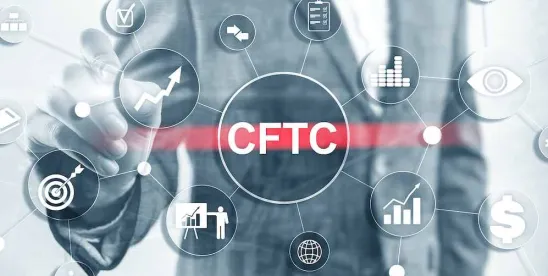Derivatives market participants continue to process the implications of two significant interpretive letters issued by the Commodity Futures Trading Commission (CFTC) staff earlier this year. Letter 25-09 effectively eliminates the pre-trade mid-market mark (PTMMM) disclosure requirement for swap dealers, while Letter 25-10 concludes that Window FX Forwards should be classified as “foreign exchange forwards,” and that package foreign exchange transactions (as defined below) should not be considered swaps.
This article highlights a number of interpretive and practical considerations that swap dealers face as they seek to implement the relief and guidance in these letters.
Letter 25-09: Relief from PTMMM Disclosures
As noted in a prior Katten article,[1] CFTC Staff Letter 25-09 effectively removes the requirement for swap dealers to provide pre-trade mid-market mark disclosures to counterparties. This represents a substantive regulatory shift, with the Market Participants Division (MPD) acknowledging that the PTMMM requirement “does not provide any significant informational value to a Swap Entity’s counterparties” while imposing “significant operational burdens on Swap Entities.” MPD issued this relief after receiving a letter from three industry trade associations requesting no-action relief from MPD staff that it will not recommend an enforcement action against a swap dealer that does not provide its counterparty with a PTMM disclosure.
Following MPD’s issuance of Letter 25-09 on April 4, 2025, some swap dealers have raised a number of implementation and operational challenges that they are facing as they try to take advantage of the relief.
- Communication. Before deciding whether or how to cease providing PTMMM disclosures to its non-swap dealer counterparties, swap dealers should consider how best to communicate changes in their PTMMM practices to ensure counterparties understand the implications for trade execution and price transparency.
- Operational Approach. Swap dealers have spent significant resources building compliance programs designed to comply with the PTMMM disclosure requirements. One key question that some swap dealers are considering is whether to dismantle these programs completely or maintain them, given their programs’ established infrastructure.
- Client Service Model. Another consideration is whether to take a more client-specific approach in determining whether to eliminate or maintain their PTMMM disclosure programs. Should swap dealers consider providing PTMMM disclosures only upon counterparty request? This approach would acknowledge that some counterparties may still find value in PTMMM disclosures while reducing the costs and risks of disclosures, which are no longer required.
- Alternative Mid-Market Pricing. Some swap dealers might find it commercially useful to provide alternative mid-market pricing to their non-swap dealer counterparties. Should swap dealers replace PTMMM with alternative pricing transparency tools that provide comparable information in a more client-friendly format?
Letter 25-10: Foreign Exchange Product Classification
Issued on April 9, CFTC Staff Letter 25-10 provides important interpretive guidance on two distinct categories of foreign exchange products that have created regulatory uncertainty in the market.
First, the letter clarifies that Window FX Forwards — transactions where counterparties may settle the exchange of currencies on one or more dates within an agreed window or series of dates — should be considered “foreign exchange forwards” as defined in section 1a(24) of the Commodity Exchange Act. This classification significantly exempts such instruments from the “swap” definition pursuant to the Treasury Determination.[2]
The Division’s analysis focuses on the statutory language that a foreign exchange forward is “a transaction that solely involves the exchange of 2 different currencies on a specific future date at a fixed rate agreed upon on the inception of the contract covering the exchange.” The interpretive position concludes that the “specific future date” requirement is satisfied when settlement will occur by a defined end date, even when flexibility exists regarding intermediate settlement dates.
Second, the letter addresses package foreign exchange spot transactions, particularly “tom/next” transactions, where parties execute two spot transactions that settle on consecutive days. The CFTC staff determined these should not be considered foreign exchange swaps or otherwise subject to swap regulations, provided they are executed, confirmed and settled as individual bona fide spot transactions within the customary T+2 timeline.
While providing welcome clarity, Letter 25-10 has sparked a couple of interpretive questions, including to what extent the interpretive principles articulated in the letter can be applied to other foreign exchange products not specifically addressed.
Practical Considerations for Market Participants
As market participants adapt to these regulatory developments,[3] several practical implementation steps warrant consideration.
- Policy and Procedure Updates. Internal compliance frameworks must be revised to reflect the changed regulatory status of PTMMM disclosures and certain foreign exchange products.
- Documentation Review. Trading documentation, including master agreements, confirmations and disclosure statements, may need to be modified to accurately reflect new regulatory classifications and operational practices.
- Systems Assessment. Technology infrastructure supporting trade execution, confirmation and settlement processes may require reconfiguration, particularly if modifying PTMMM disclosure practices or reclassifying certain foreign exchange transactions.
- Client Communications. Proactive engagement with counterparties regarding the implementation approach is essential, particularly for swap dealers modifying their PTMMM disclosure practices.
As implementation practices develop, market participants should document their interpretive positions and maintain open communication with regulators around remaining areas of uncertainty.
[1]See Katten’s Quick Reads coverage of Letter 25-09 here.
[2] Determination of Foreign Exchange Swaps and Foreign Exchange Forwards Under the Commodity Exchange Act, 77 Fed. Reg. 69,694 (Nov. 20, 2012) (Treasury Determination).
[3]See Katten’s Quick Reads coverage of the expected impact of the 2024 presidential election on swap dealers here.




 />i
/>i

